
Welcome to our Meet the SDG3 researcher blog collection. We are interviewing a series of academics and practitioners working in diverse fields to achieve Sustainable Development Goal 3: Ensure healthy lives and promote well-being for all at all ages. You can find other posts in this collection here, and discover what else Springer Nature is doing to advance progress towards achieving this goal on our dedicated SDG3 hub.
Please tell us a bit about yourself.
I obtained completed my Bachelor of Medicine, Bachelor of Surgery degree from the University of Calabar in Nigeria. My first-hand experience of a child succumbing to an antimicrobial resistant infection during my internship year as a fresh medical graduate shaped my interest in Paediatrics and infectious diseases.
I began my residency training in Paediatrics at the University of Calabar Teaching Hospital, Calabar as well as working as a Clinical Research Assistant in the clinical trials and evidence-based medicine unit at the Hospital’s Institute of Tropical Disease Research & Prevention under the supervision and mentorship of Professor Martin Meremikwu, who was the deputy director of the Institute and my supervising paediatric consultant.
Given my keen interest in clinical research, Professor Meremikwu encouraged me to take up a job opportunity as a Medical Officer at then Medical Research Council (MRC) Laboratories, The Gambia, and I relocated to the Gambia in December in 2004. Many African-trained medical doctors migrate to UK and America for postgraduate training and better career opportunities. At some point after moving to The Gambia, I also considered making such a move having grown up with a surgeon for a dad, who also did his postgraduate training in the UK and is a Fellow of the Royal College of Surgeons. At the same time, I also wanted to contribute to Africa-led research output on the continent having noticed that there were not many African scientists leading research. I owe much of my decision to remain in Africa to Professor Tumani Corrah, the then MRC Unit Director, and his mentorship and passion for development of African scientists. To broaden my research skills, I completed a Master of Science degree in Epidemiology at the London School of Hygiene and Tropical Medicine (LSHTM), funded by the Commonwealth Scholarship Commission.
My initial research work focused diseases associated with a high burden on under-five mortality in Africa – malaria, pneumonia, HIV/AIDS and malnutrition.
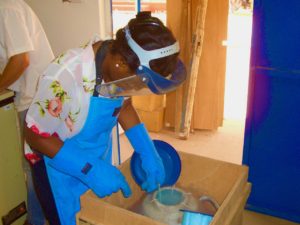
I was fortunate enough to work as a Research Clinician with Dr Assan Jaye, an immunologist who won an Elizabeth Glaser Paediatric AIDS Foundation (EGPAF) International Leadership Award to establish a Paediatric HIV/AIDS clinical research cohort. Supported by funding from the Global Fund to fight AIDS, Tuberculosis, Malaria, and EGPAF, I undertook training in Uganda and UK on comprehensive paediatric HIV/AIDS care, prevention, and research. This training provided me with the knowledge and skills to set up a national paediatric HIV/AIDS cohort in The Gambia in partnership with the National AIDS Secretariat, to improve capacity for clinical care and research through clinical mentorship.
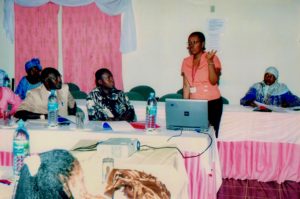
Whilst on secondment to the Department of Paediatrics, Edward Francis Small Teaching Hospital, Banjul, The Gambia, I was alarmed by the number of neonatal in-patient deaths on the neonatal ward and led the first ever audit of quality of facility-based neonatal care and outcomes. Our findings confirmed a very high burden of neonatal mortality (35% of all neonatal admissions) at the teaching hospital and only neonatal unit in the country. The audit also quantified the contribution of neonatal sepsis to neonatal admissions and mortality and highlighted the mismatch of treatment and investigations: over 94% of all neonatal admissions received antibiotics yet only 2% are investigated for the presence of infection.
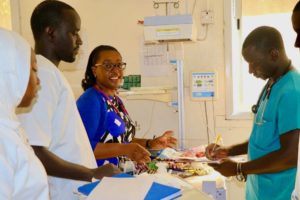
These observations led to several questions that resulted in my PhD in Epidemiology and Population Health from the LSHTM funded through a PhD studentship from the UK Medical Research Council. My doctoral research focused on neonatal infections, transmission dynamics and hospital/community acquired neonatal infections, including antimicrobial resistance. I was supervised by two incredible female researchers and leaders in the field – Professors Joy Lawn and Beate Kampmann. I owe much of my success to these women and their mentorship.
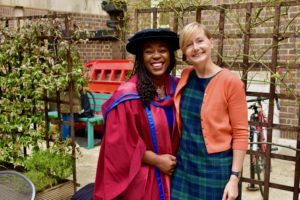
There yet remain many unanswered questions about the source of, and dynamics of acquisition of serious infections in newborns, particularly in low-resource settings. For my postdoctoral research I am now driven to push the envelope and move my research from the observational to a detailed understanding of mechanisms of infection and antimicrobial resistance transmission to improve care underpinned by scientific evidence. My research is funded by the Thrasher Research Fund (USA) and The MRC/NIHR (UK) amongst others. I also work closely with the Edward Francis Small Teaching Hospital, Banjul, and the Ministry of Health of The Gambia, whilst expanding my research collaborations.
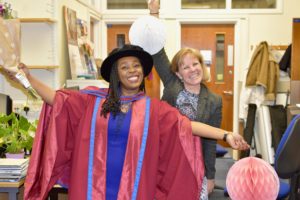
Some of my career highlights include winning the 2019 Elsevier Foundation-OWSD Award in Agriculture, Biology and Medicine for Early Career Women Scientists in the Developing World; the 2019 Director’s Award for “Research Leader of Tomorrow” , MRC Unit The Gambia at LSHTM; the LSHTM Antimicrobial Resistance Centre Publication Prize in both 2020 and 2021; and serving as The Gambia Chapter Chairman & Vice President of the West African College of Physicians.
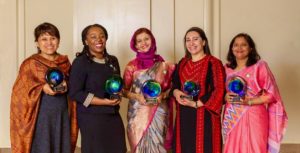
How does your work relate to SDG3?
My research is directly related to SDG3 which aims to ensure healthy lives and promote well-being for all at all ages. Specifically, my research falls under SDG 3.2 which aims by 2030 to end preventable deaths of newborns and children under 5 years of age, with all countries aiming to reduce neonatal mortality to at least as low as 12 per 1,000 live births and under-5 mortality to at least as low as 25 per 1,000 live births.
Neonatal infections are estimated to account for 26% of the 2.4 million annual neonatal deaths globally, with the highest prevalence and mortality risks in Sub-Saharan Africa (SSA), particularly West and Central Africa. The SDG 3.2 target indicator for neonatal mortality cannot be met without substantial reduction of infection-specific neonatal mortality in the region.
Robust country and regional data on the aetiology, source and route of infection, as well as antimicrobial resistance (AMR), are essential to informing and prioritising appropriate prevention strategies. In one of my studies, I aimed to bridge a critical gap in our knowledge of the causes of invasive bacterial infection and antimicrobial resistance among neonates in sub-Saharan Africa.
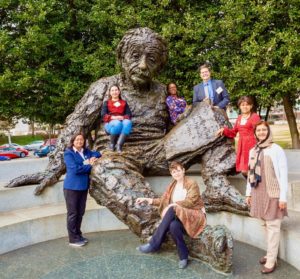
Different risk factors and environments may affect transmission of infection to the newborn. To address additional questions regarding routes of infection transmission among newborns with bacterial sepsis, my research is now combining traditional microbiological bacterial culture techniques with advanced techniques, particularly whole-genome sequencing (WGS). In one of our studies, we used both techniques to characterise two outbreaks of hospital-acquired infection in the neonatal ward, and traced the source of infection to intravenous fluids and medications that were contaminated on the ward during preparation for use.
What’s the most pressing research question in your field and/or your hopes for progress in the future?
Despite a declining neonatal mortality rate globally, marked disparities in neonatal mortality exist across regions and countries. In 2019, two regions of the world – sub-Saharan Africa and South Asia – accounted for over 80% of neonatal deaths. Neonatal mortality was highest in these regions being estimated at 27 per 1,000 live births in sub-Saharan Africa and 25 deaths per 1,000 live births in South Asia. A child born in sub-Saharan Africa is 10 times more likely to die in the first month than a child born in a high-income country.
Neonatal infections are responsible for 1.6 times the global number of childhood deaths as malaria, and over four times the number of childhood deaths caused by HIV. Neonatal infections also pose a massive public health and economic burden for sub-Saharan Africa, amounting to an estimated annual loss of 5.29–8.73 million disability-adjusted life years (DALY). Because sub-Saharan Africa bears a disproportionate burden of neonatal deaths, we cannot achieve SDG 3 without substantial reduction of infection-specific neonatal mortality in the region. Critical to any successful policy decisions and interventions to reduce the burden of neonatal infection, therefore, are strategic investment in high-quality data, reliable identification of causative pathogens, and thorough understanding of transmission dynamics.
Reported widespread resistance of causative pathogens of neonatal infections in sub-Saharan Africa to WHO-recommended first-line and second-line antibiotics, as well as limited drug options, pose a serious threat to public health and the successful treatment of neonatal infections.
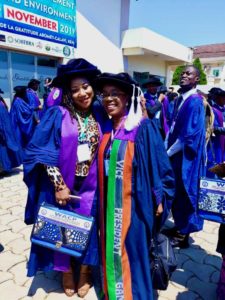
The COVID pandemic has shone the spotlight on how interconnected and interdependent our world has become. It has also illustrated our common vulnerability, across borders, beyond North-South, East-West, public-private divides, and the limits of segmented approached to tackling global public health. This means adopting a more holistic and comprehensive multidisciplinary and interdisciplinary approach to addressing our collective challenges, and specifically in my case, the high burden of neonatal infection morbidity and mortality. Despite the disruption of maternal, newborn, and child health services across resource-limited settings in additional to the ripple effect on neonatal mortality, I strongly believe the COVID pandemic to be a turning point for infectious disease epidemiology in sub-Saharan Africa; it has presented new opportunities for local and regional scientific leadership to address the unresolved burden on neonatal mortality, especially but not limited to infections and antimicrobial resistance.
Please describe hurdles you’ve come across during your career
The concept of the clinician scientist is not common in West Africa given the long training required in both medicine and science, and there were few role models in my specialty (much fewer women) from whom I could learn. I have shifted the status quo and will continue to push the bar for the African female clinical researchers. However, combining clinical research with an academic career, clinical work, and leadership/administrative responsibilities alongside being a parent, is quite challenging. Although I really love what I do, it is mentally and physically draining to always maintain the balancing act, and I must remind myself now and then that I need to take care of myself mentally and physically too! Fortunately, I have been blessed at every stage of my career with mentors and friends who provide the much needed 360° support.
Please tell us about a resource or person that has particularly inspired you?
My greatest inspiration comes from home – my parents. My dad is a surgeon and my mother a medical microbiologist, although both are now retired. They came from very poor and humble beginnings but did not let this limit their dreams and aspirations. Growing up, my brothers and I loved to listen to the stories of how they worked hard and persevered to achieve their dreams despite numerous challenges. They also encouraged us to be inquisitive and explore our environment. My dad would always say to us ‘nothing is impossible – it just hasn’t been figured out yet’.
You can find other posts in this collection here.
At Springer Nature we are committed to playing our role in advancing progress towards achieving SDG3 by both supporting researchers and being an active voice, promoting an interdisciplinary evidenced-based approach to all targets and indicators within this goal. Learn more about our SDG3 activities and the Springer Nature SDG Programme.
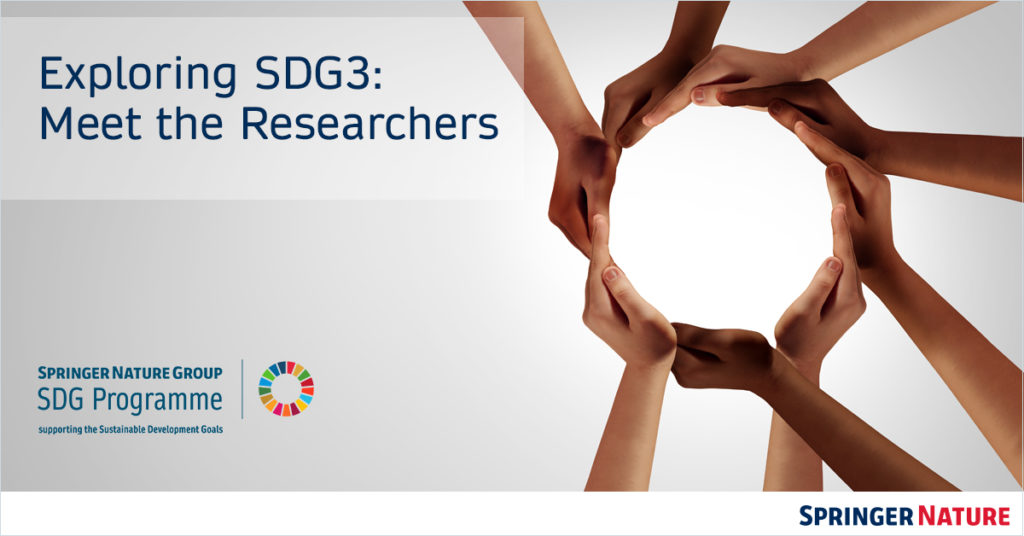
Comments